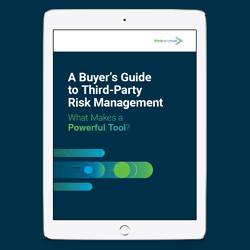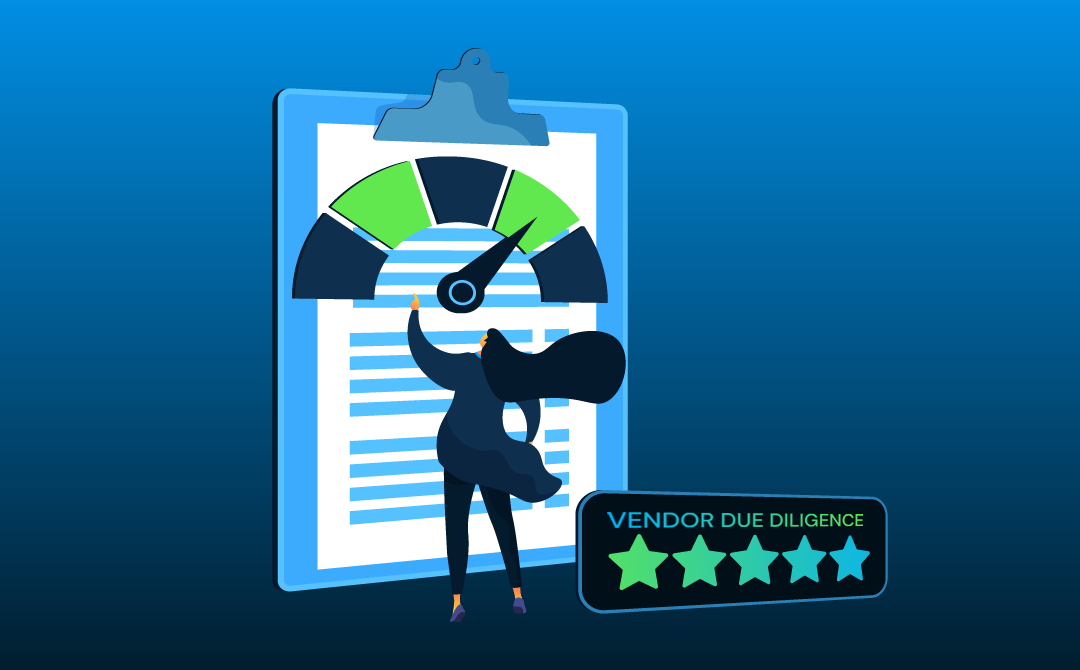What is due diligence in third party risk management?
When assessing risk from third party vendors, one term usually comes up: due diligence. What is due diligence, though, and how does it relate to vendor management?
Due diligence is the investigation that a business or person takes before entering into an agreement or contract with another party, in order to confirm the accuracy of the offer and appraise its value.
These investigations are conducted across industries in many business cases, such as:
- Investors and companies considering M&A deals, including equity research analysts, fund managers, broker dealers, and individual investors.
- Buyers and sellers seeking to determine whether the other party has substantial assets to complete the purchase, either for legal or voluntary reasons.
- Employers conducting a background check on a potential employee.
- Organizations seeking to assess the inherent risk of engaging with a new third party vendor for outsourced services like accounting, cloud hosting, logistics, and more.
Throughout the years, the term due diligence has grown from everyday use to encapsulate legal, business, compliance, and investment connotations.
Performing due diligence as part of your vendor management
With increased reliance on third party vendors for critical services, as well as increased scrutiny from examiners and customer expectations, security and compliance leaders are under pressure to deliver vendor due diligence results in a timely manner.
In the context of third party risk management (TPRM), vendor due diligence is the process by which an organization examines a current or potential third party vendor’s risk to its business operations. It’s often a regulatory requirement in guidelines such as those issued by the OCC and the FFIEC.
As outlined in the FDIC Financial Institution Letter 44-2008:
Comprehensive due diligence involves a review of all available information about a potential third party, focusing on the entity’s financial condition, its specific relevant experience, its knowledge of applicable laws and regulations, its reputation, and the scope and effectiveness of its operations and controls.
In essence, vendor due diligence is a risk-based decision making process, where you collect and analyze as much information as possible from a vendor before making a decision to engage with them in a business relationship.
Read more: How to conduct a vendor risk assessment
Vendor due diligence tips
While often perceived as manual and time-consuming, due diligence can be streamlined, standardized, and automated given the right toolset.
After all, it’s in your organization’s best interest to ensure that vendors have been appropriately vetted and are protecting your sensitive data.
Here are some tips for your reviews:
- Prioritize vendors by risk and set the requirements needed for each level of risk associated with the product or service; don’t subject all vendors to the same scrutiny.
- Set alerts for reassessments and document updates; documents like SOC reports, financial statements, business continuity or disaster recovery plans expire or become outdated, so make sure you always have their latest versions.
- Create a procedure for approving due diligence when you can’t gather enough evidence; eventually, the answer will be “no”, so make sure you document the outcome.
- Take the time to analyze the evidence instead of just collecting it, and document your findings.
- Store all evidence and documentation in a safe place, like a dedicated vendor management repository.
- Investigate the following factors: business impact analysis, business type, insurance, contracts and SLAs, relationship ownership, confidentiality statements, business continuity and disaster recovery plans, and overall security posture.
Whether you use a standardized questionnaire for all vendors or a series of custom questionnaires, due diligence is a fundamental pillar of vendor management. One that ultimately protects your organization, your customers, and your data.
Need help with your vendor management program?
ThirdPartyTrust specializes in vendor risk management, with a dedicated tool where enterprises and vendors connect to perform risk assessments, automate TPRM and compliance workflows, and share security documents. Contact us today to learn more.

Looking for a vendor risk management tool?
Finding the right TPRM tool is a unique process for every organization as they navigate their journey to TPRM maturity.
This guide will help you decide based on your needs around security ratings, custom questionnaires, integrations, and other features.




